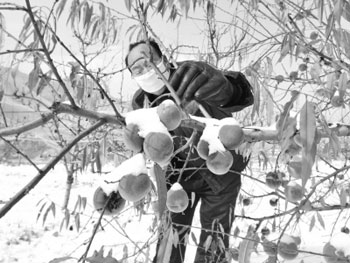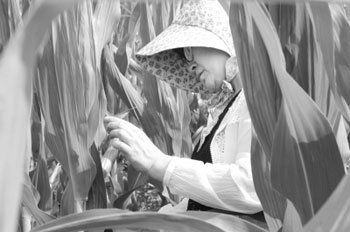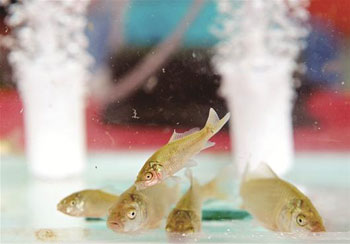Non-genetically modified crops are not afraid of cold minority crops have great potential
Original title: why on earth are they not afraid of the cold?
Who said that winter is the idle season, in Zichuan, Shandong, Shenyang, Liaoning, Lijiang, Yunnan, thinning flowers, picking fruit, pruning, fruit farmers are very busy, Sydney, snow peach, Hanfu apple high yield and high quality.
So, why are melon, fruit, peaches and peaches that are not tolerant to low temperature not afraid of the cold? It turns out that freezing resistance and cold tolerance are their common "temperament". Since then, the fresh fruits of the four seasons no longer rely solely on facility agriculture.
The following is to appreciate the elegant demeanor of a batch of delicious, good-looking, and precious "not afraid of cold" fruits selected and bred by researchers after several years of careful optimization and training, making use of the superior natural, ecological, and climatic conditions of various places.
Sydney peach
There is nothing to be afraid of in the cold

Data map
Yan Shengting, our reporter Lv Bingbing
On November 26th, in Zichuan District, Zibo City, Shandong Province, the first snow in 2015 arrived as scheduled, falling for three consecutive days, bringing the local lowest temperature at night to-13 ℃. However, in the orchard of Jiao Yuliang, a farmer in Xiangquan Village, Taihe Town, "Lesser Snow peach" and "Chuanshan snow pear" two kinds of fruit still hang high branches, water spirit is still the same, set off with the white snow, has become a beautiful scenery in winter. Can you pick peaches and pears in the snow? Yes, this is Jiao Yuliang's new achievement after 10 years of research and development.
Xiangquan Village is located in Ezhuang Ancient Village National Forest Park, with dense forest resources, four distinct seasons and large temperature difference between day and night, forming a unique "microclimate". Xiangquan Grand Canyon, which is more than 800 meters above sea level, has a steep topography. Walking along the rope is Jiao Yuliang's 80 mu orchard, mainly planting pears, peaches, kiwifruit and other forest fruits.
Jiao Yuliang recalled that an early snow in 2005 made Jiao Yuliang not have time to pick the golden pear on the tree, resulting in heavy losses. However, the disaster left him an unexpected delight. In the following spring, when he was pruning branches, he was surprised to find that two bagged golden pears still had no fruit on the tree after a cold winter, and they were still the golden yellow of water spirit. "at that time, when I was surprised, I felt that there must be a secret. Is it bud change, branch change, or seed variation?. So I took these two pears as experiments, cultivated dozens of native seedlings, began to graft them with rootstocks, and consulted experts everywhere to experiment repeatedly. " Jiao Yuliang said.
In order to cultivate ice-resistant and cold-resistant Sydney, Jiao Yuliang went to the mountains to study every day in winter wearing cotton-padded clothes and boots. During the Spring Festival, he did not bother to visit relatives and friends. He went up to the mountain to see seedlings on the second day of the Lunar New year. He really suffered a lot and failed many times. Thanks to his unremitting efforts, he finally cultivated a cold-resistant snow pear after 8 years.
At first, the pear was as big as a small watermelon, so he named it "Watermelon Pear" because it could not be picked until after Lesser Snow, so he named the new variety "Chuanshan Snow Pear" under the guidance of experts. This achievement won the second prize of Zibo Agricultural Entrepreneurship and creativity Competition in 2014.
Since 2012, according to the principle of cultivating "Chuanshan Snow Pear", Jiao Yuliang has cultivated a new cold-resistant variety "Lesser Snow peach" for 3 years. According to reports, "Lesser Snow peach" has the characteristics of late maturity, high sugar content, high nutritional value, drought resistance, no agricultural time, no storage, and so on. Lesser Snow begins to mature after seven or eight peaches, and can be picked and sold now. To this end, Jiao Yuliang made up an interesting limerick: the Queen Mother of Heaven gave treasures to the world, laughing proud of Bing Xue Le Enron.
After the first snow in winter, the snow peach becomes interesting to each other, and because the snow peach has a long growth cycle and a late ripening period, after the baptism of frost and snow, it has high sugar acidity, rich nutrition and excellent taste, which is deeply welcomed by consumers. This makes Jiao Yuliang particularly busy in the cold winter months. "Sydney has planted several mu this year, and even 10 yuan per jin is very popular. Well, Manager Sun of Linzi asked for another 10,000 yuan of goods, but we were in short supply, so we could only provide him with goods of 3000 yuan. " Jiao Yuliang said.
Talking about future development, Jiao Yuliang, secretary of the village party branch of Xiangquan Village and chairman of the Xiangquan Grand Canyon Rural Tourism Cooperative in Zichuan District, said that he plans to build a planting base next year, planting 12 mu of "Chuanshan Snow Pear" and 6 mu of "Lesser Snow peach." On this basis, we should expand planting in a large area among the masses, provide technical guidance free of charge, really make idle farmers busy, and drum up the "money bag" of fruit farmers in mountainous areas.
Hanfu apple
Pushed 200 kilometers north.
Data map
Our reporter Yu Xianfeng and Zhang Renjun
Liaodong Peninsula is a high-quality apple cultivation area, which mainly refers to the south of Liaoning Province. Previously, apples could not be seen in Shenyang and the north. However, in recent years, apple planting in Shenyang has been popularized on a large scale, mainly because of the existence of cold-resistant variety "Hanfu".
The cultivation of cold-resistant big apples is the research topic of countless scientists in the world. It has always been believed that it is difficult for big apples to survive the winter in areas where the average temperature in January is below-12 ℃. The fruit tree cultivation and physiological and ecological innovation team of Shenyang Agricultural University strives to explore and solve the major problems faced by the development of science and technology.
After 15 years of efforts, it broke through the bottleneck of low temperature limiting the cultivation area of big apple, formed a high-efficiency apple industry in the northern margin of traditional big apple cultivation in China and the vast cool areas to the north, and pushed the cultivation area of high-quality big apple northward for 200 kilometers. Nearly 2 geographical latitudes.
Marshal, Fuji and other major big apple varieties in the world have weak cold resistance, which are distributed in the ecological suitable areas where the annual average temperature is 8.5℃ ~ 14 ℃ and the lowest monthly average temperature is-9 ℃ ~ 8 ℃. The vast cold area to the north of 40 °north latitude in China is rich in land and light resources, which has many conditions for the development of apple industry, but due to the limitation of the average temperature in January, such as-10 ℃, Fuji and other traditional big apples can not be cultivated.
The cold resistance and high quality bred by Shenyang Agricultural University in 1997 broke through this limitation, but at the initial stage of introduction and trial planting, there were many seedling lines because they did not have a deep understanding of the characteristics and growth characteristics of each variety (line). In addition, fruit growers lack of understanding of low temperature and other natural conditions, and blindly expand the cultivation areas to the north. These areas are new apple cultivation areas, and fruit farmers have no production experience and lack of supporting cultivation technology system, resulting in frequent freezing injury of branches and buds, diseases and insect pests. The garden appearance is not tidy, the yield is not high, the quality is low, and large-scale production is not formed.
For this reason, the fruit tree innovation team of Shenyang Agricultural University, from the angles of physiology and anatomy, screened and evaluated the varieties of "Ningfeng", "Ningshui", "Hanfu" and "Hanguang" which were filed by Liaoning seed Administration and other mixed Hanfu sister lines, and developed the corresponding seedling breeding techniques.
Lu Germany, the leader of the team, told reporters that their research results made it clear for the first time that "Hanfu" has stronger comprehensive resistance to cold, drought and disease resistance than "Fuji" and other major apple varieties in China. It has the characteristics of self-fruiting, high fruit setting rate, easy flowering of axillary buds, top flower buds that can still meet the needs of fruit after freezing, fruit shape, good quality, storage resistance, easy early fruit and high yield. The biological and physiological mechanism of high quality cultivation in the northern margin of traditional big apple cultivation and the area where the average temperature in January was-12 ℃ ~-10 ℃ was revealed, which laid the theoretical foundation for the development of matching planting technology system. According to the present situation of natural resources and fruit tree belt layout in cool areas, multi-regional trial planting was carried out, and finally the "Hanfu" apple planting regionalization was completed, which provided a scientific basis for the development of cold-resistant and high-quality apple industry in China.
- Prev

The automatic prediction of diseases and insect pests in the whole process is accurate and fast.
The automatic prediction of diseases and insect pests in the whole process is accurate and fast.
- Next

When will the commercialization of genetically modified carp in China break?
When will the commercialization of genetically modified carp in China break?
Related
- A course of planting techniques and methods on how to grow carrots
- How to plant the latest tulips?
- Is it better to pick tea in the morning or in the afternoon? When is the best time for tea to be picked? what is the third or fifth tea?
- Launch Yuanxiao Happy combination Haocha + Tea Yuan healthy Taste
- Penghu Tourism "Fireworks 20 Parade with You"
- 2022 West Lake Happiness holds "Digital Revitalization Voucher" and draws iphone13 and laptop.
- Banqiao Fuzhou social houses are designed to change start-up combined with police elimination to create a safe and livable environment
- The convenient measure of "mechanical weeding" in Xinbei has been abused and the Agriculture Bureau has imposed heavy penalties on the illegal land consolidation.
- Changgeng University Joins Hands with Four Memory Factories to Rescue Memory Talent Shortage
- The list of Taiwan's top 100 MVP managers is listed by the Director-General of the Farmers' Association of Sanxia District.

